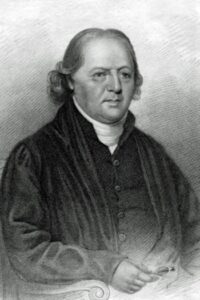
Freeborn Garrettson
*Freeborn Garrettson was born on this date in 1752. He was a white American preacher and abolitionist.
Born in 1752 on the west side of the Chesapeake Bay in Maryland, near what is now known as Bush River Neck, Freeborn Garrettson was the third generation in his family to live there. The Garrettson family owned a large amount of land, which included a farm, a general store, and a blacksmith shop. The Garrettson estate was a prosperous property, made even more valuable by the numerous slave families who managed it. Growing up, Garrettson, the offspring of well-to-do farmers, was well educated. He later inherited his parents' plantation and its many slaves.
"Do you know what a saint is?" This question marked the beginning of Garrettson's conversion experience. Shortly after this episode, at the age of 10, he lost his mother, his sister Sally, and two family servants. The deaths caused his spiritual yearnings to lie dormant for nearly ten years. Almost a decade later, the preaching of Methodist itinerants awakened the spirituals in him. Garrettson first became a Methodist preacher in 1775.
Early in his career, he served the Delmarva Peninsula. He refused to fight in the American Revolution and was imprisoned in a Maryland jail for a time. Most of the Methodist preachers who had come from England before the outbreak of the war returned there once the war began. In 1784, Garrettson went as a missionary to Nova Scotia, which led to the establishment of the free black settlement of Birchtown, Nova Scotia. In the late 1780s, Garrettson settled in Rhinebeck, New York.
Garrettson was ordained a Methodist elder at the 1784 conference in Baltimore. He married Catherine Livingston in 1793, and they had one daughter. Not long after Garrettson inherited several slaves, he freed them. Garrettson wrote that a "voice" moved him to do so. His journals divulge an anti-slavery stance, but do not reveal the extent of his activism. His preaching against slavery resulted in his being jailed in Cambridge, Maryland. A wave of voluntary emancipation mirrored and followed Garrettson's time on the Delmarva peninsula. By 1810, 76% of Africans in Delaware were free, though slavery remained legal there. Garrettson wrote on the issue of slavery, including a published work, "A Dialogue Between Do-Justice and Professing Christian."
Garrettson's preaching on the Delmarva led directly to the emancipation of Richard Allen, who founded the Bethel Church and then the African Methodist Episcopal (A.M.E.) denomination. After settling in New York, Garrettson continued to be a Methodist circuit rider. He and his wife made their home a regular place for other circuit riders to stop and recuperate. He died on September 26, 1827.